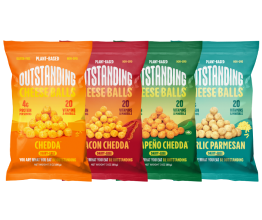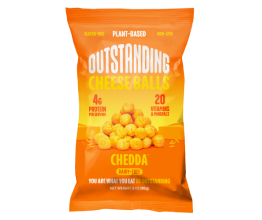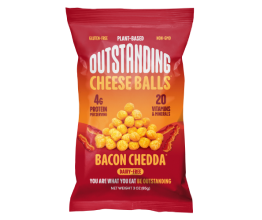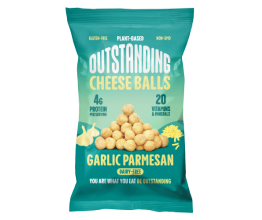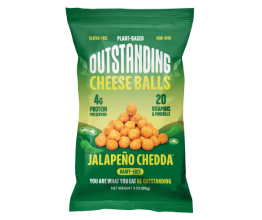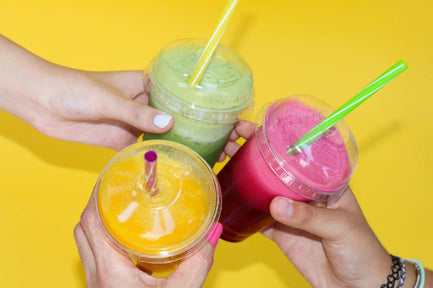Food & The Environment: How a Plant-Based Diet Makes a Difference
There’s no doubt that the food we eat has a real effect on our health. But what about Mother Earth’s health? Did you know you can do your home planet a solid with just your grocery shopping?
If you want to get off the sidelines and start making a positive environmental impact, shifting away from animal-based foods is an awesome first step. This article will walk you through several benefits of a plant-based diet for the ecosystem and our bodies.
Feeling overwhelmed? Don’t be. Keep reading for all the deets on carbon emissions, water usage, and the best planted-based snacks to rely on.
Food and Environment: The Connection
You might be wondering exactly how something as small as our food choices make a difference in environmental health, but when you look at the big picture? Totally crystal clear.
It’s easy to forget that every single food product we consume comes from a natural original source, especially if we live in cities and buy everything from fluorescent-lit stores.
Let’s take a closer look at how different foods impact the environment and make a case for plant-based eating as a way to give our planet a little TLC.
Greenhouse Gas Emissions
It’s the buzzword we’ve all heard before: greenhouse gas. But what even are they? These are the dense and dangerous compounds that flood the atmosphere and “lock in” heat over time, steadily raising the temperature of the earth and setting off alarms. Yikes.
Greenhouse gases are thought to be the byproduct of industrial production of all kinds, including animal-based food products. Figures vary, but scientists agree that the production of meat creates far more greenhouse gas than the farming of plant-based foods.
Beef and pork are the worst culprits, but even chicken and fish production send millions of units of greenhouse gas into the air every year.
With concerns about rising rates of greenhouse gases, it’s essential to cut down on the amount of meat we consume and start shifting things in the right direction.
Water Usage and Natural Resources
The planet does not have an infinite amount of freshwater, and it’s well known that animal products require far more water to produce compared to plant-based foods. Now, that’s what we call a thirst trap.
Some of the numbers are astounding when you make a side-by-side comparison. For example, according to UC Davis, it takes between 2,000 and 8,000 gallons of water to produce just a single pound of beef, compared to ~300 gallons to produce one pound of tofu or oats.
Even one gallon of cow’s milk requires nearly 2,000 gallons of water – not a great cost/benefit analysis when you run the numbers.
If everyone on the planet made the shift to a 100% plant-based diet right now, we’d cut down on water use by a whopping 50%. Just like studying for a test, a little overtime is where you see the biggest gains.
Nature Preservation
A lot of people have shirts that say, “Save the Rainforest,” but how many people actually try to be environmental warriors? We’re not asking you to go plant trees or nurse a baby jaguar back to health (although that would legit be awesome), but there are lots of ways we can help heal the planet.
It’s not just the rainforest that is hurting; local and global environments are in more danger than ever. We mean, forget about our need for clean water and breathable air, but where would they film new series of Survivor if the natural world disappears? We joke, but the number one way you can heal the world if you’re not Greta Thunberg is to change what you eat.
Shifting to Plant-Based Living
If you’re on the fence about switching over to a plant-based diet, the environmental factors alone should seem as attractive as the cast of a Marvel movie.
Not only does Mother Earth profit, but so does the body your mother gave you: plant-based diets help everything from blood pressure, metabolic health, cholesterol, and beyond.
Keep the following tips in mind when going plant-based. And no, no one expects you to be perfect at this at first!
Everyday Food Choices
Your plant-based lifestyle isn’t going to come together all at once. Like anything worthwhile in life, it’s going to take time! Start by slowly cutting down on the amount of meat you consume each day, and make a conscious effort to replace meat with healthy, tasty alternatives.
If you eat bacon for breakfast, a deli sandwich for lunch, and steak for dinner, try taking it down to just two meat-based meals a day. Try fruit and toast for breakfast instead, or have a green smoothie that gives you all those key nutrients.
Maybe you aren’t so excited about eating plant-based proteins like tofu or tempeh, but you might be surprised how insanely delish these can be when prepared to perfection.
We’ll get to some other food recommendations later, but for now, just remember to take your time getting into the plant-based way of life and start trying out a range of new things.
Other Products and Goods
Many animal products have nothing to do with food, and they still make their way into daily life. They’re less obvious than having a bear rug or mink coat. Be aware of buying things animal fiber clothes, household goods, and other items that could be derived from animals.
Fast fashion is the sworn enemy of environmental protection, too.
It’s also important to educate yourself about the environmental impact of different products we use around the house and in our daily lives. Plastics, for instance, are notoriously bad for the environment and require huge amounts of fuel and water to produce. So bonus points for taking a reusable water bottle with you (deck it out in stickers, and you’ve basically got a new accessory).
Look beyond your plate and figure out ways to consume more consciously while minimizing waste and setting the bar higher for yourself and others.
Broader Lifestyle Changes
Just because you embrace a plant-based diet doesn’t mean you’re instantly Jane Goodall (we can dream, though)! Switching up your diet is just the first step in a series of decisions that will help reduce your overall footprint and set an example for others in your life.
Use the plant-based diet as a starting point for other positive changes, such as cutting down on the amount of water you use in the home or how much you drive around town during the week.
Look at things like electric and gas bills, and figure out ways to reduce your requirements.
You might find that making these other changes becomes even easier once you’re all-in on plant-based eating. These habits build on one another, like a totally stable version of Jenga.
Our Recommendations
Back to the subject of food, we’ve got some suggestions to make your plant-based diet easier to manage and enjoy. If you’ve been eating meat for decades, it can be tough to break through, but hopefully, these principles will help you out when deciding what to eat.
Balanced Meals
When making any type of dietary change, your focus should be on the three square meals you eat every day. Too many people focus on things like snacks and what to eat on the go. When your meals are well-balanced and structured, those other factors are less important.
Complex carbohydrates and plant proteins are going to be your best friends when designing meals at first since they’ll fill you up and keep you fueled for hours at a time.
Load up your pantry with ingredients like legumes, quinoa, brown rice, barley, and other ancient grains that you can boil up fast and keep stored in the fridge.
Look into recipes for tofu, tempeh, seitan, and other protein sources that absorb flavor and offer a toothy substitute for meat. Of course, keep those fresh fruits and veggies flowing since they will be the stars of the show.
Healthy Snacks
You’ll eventually need something to snack on when going plant-based, which is why we recommend our famous PigOut Pigless Pork Rinds as a great all-around choice.
If you’re a fan of pork rinds, this snack replicates the big crunch and flavor that you’ll be nostalgic for. Alternatively, our Outstanding Puffs offer a delicious and viable meal replacement when you’re on the run and need some real nutrition.
These are tasty, healthy, vegan snacks that are loaded with protein, nutrients, and flavor. That’s just what we do at Outstanding Foods! Not trying to brag or anything!
A Delicious Conclusion
Going plant-based is a great thing for your body and the planet. So next time you’re looking for a bite to eat, think plant-based. If Mother Earth could talk, she’d say thank you (and give you a sick fist bump).
Sources:
The Case for Plant Based | UCLA
A Vegan Diet: Eating for the Environment | Physicians Committee for Responsible Medicine
